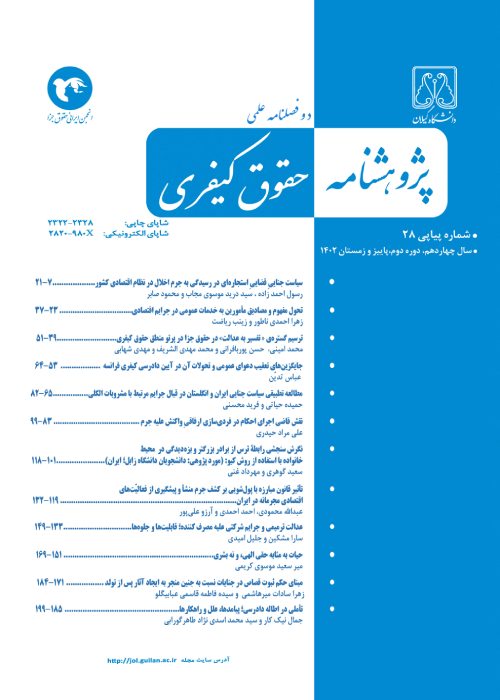Combinatory Criminal Policy Strategy in Democratic and Totalitarian Models of Criminal Policyy
Combinatory criminal policy based on the conscious and purposeful process of combining variables with maximum use of governmental, public and international capacities to control the criminal Phenomenon , by changing the scope of criminal policy, expands the border of crime from criminal law to administrative, disciplinary, trade union, etc. It is inspired by international and domestic documents, strategies and recommends and adopts a variety of measures. Studies show that the combined criminal policy strategy in the democratic model, with no complete abstraction from libertarianism and with the transformation of criminal law in favor of alternative variables, forms a positive and empowering synergy against crime. But, in The totalitarianism model of negative and empowering convergence, along with the inflation of criminal law in order to maintain political order, will be accompanied by a maximum advance in the legitimate rights and freedoms of citizens.
The Combinatory criminal policy is a new strategy in the field of criminal policy that involves maximum use of the capacity of the interface institutions and the complimentary of the penal justice system in response To normalize, other than the judiciary on the one hand and the provision of the capacity of the executive, parliament, civil society, media, associations, and citizens to create consensus on the other. With all its influence, the approach of the Combinatory strategy in democratic models and totalitarian criminal policy is presented.
This research has been done by descriptive-analytical method and relying on democratic and totalitarian models of criminal Policy and studying the laws and regulations of legal systems in the form of documents and libraries.
In a democratic model, social capital is the ability to expand collective action and merge variables and use the capabilities of triple forces in the development of citizen maneuver space, diversion with the development of civil society in favor of civil society, reduction Of enterprise and the use of community participation in optimal management of the country. In fact, the state function of the combinatory criminal Policy has led to the combination of social, economic, cultural, and etc that the existence of multiple variables generating crime leads to the combination of different variables in the normalize andrespondology criminal policy of the criminals, judicial and administrative policy.In contrast, the combinatory strategy in a totalitarian criminal policy model is consistent with the superiority of executive branch institutions in policing and security networks, which can be legitimacy to eliminate or expel criminal, incapacitation, corporal punishment development, and maximum suppression conditions. The possible formation of civil society and non - formal and secondary organizations is a means of bringing the subjection of political, social, economic, economic to citizens, which, on the basis, is defined by the government. so the crystallization of a combined strategy in these communities will lead to the benefit from the prevention of public crime, even to the privacy of citizens ' private morals, and the development of the range of criminal law through the open criminalization and the strengthening of state networks of criminal policy.
Combinatory criminal policy in the democratic model, with no complete abstraction from libertarianism and with the transformation of criminal law in favor of alternative variables, forms a positive and empowering synergy against crime, but in The totalitarianism model of negative and empowering convergence, along with the inflation of criminal law in order to maintain political order, will be accompanied by a maximum advance in the legitimate rights and freedoms of citizens.
- حق عضویت دریافتی صرف حمایت از نشریات عضو و نگهداری، تکمیل و توسعه مگیران میشود.
- پرداخت حق اشتراک و دانلود مقالات اجازه بازنشر آن در سایر رسانههای چاپی و دیجیتال را به کاربر نمیدهد.


